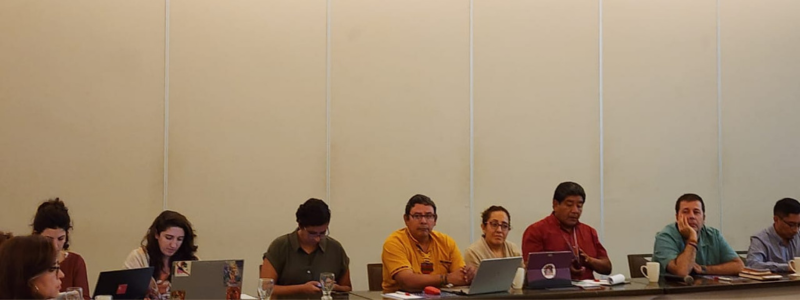On July 28, 2023, the Regional Assembly of Civil Organizations on Migration Trends in Latin America and the Caribbean was held in Panama, and the RFM was represented by René Flores from RFM-Panama and Beatriz Calixto from RFM-Mexico.
Most of the 15 participants were from different networks and organizations that defend migrants’ rights in the region, from Argentina to the US. In addition to the warm atmosphere and hard work, the participants raised concerns and challenges regarding of the integrity of the lives of people who are migrating. Among the governing documents for joint reflection and strategizing is the “Los Angeles Declaration on Migration and Protection.”[1]
In this “Los Angeles Declaration,” the signatory governments stated that, “We are determined to protect the safety and dignity of all migrants, refugees, asylum seekers and stateless persons, regardless of their immigration status, and to respect their human rights and fundamental freedoms. We intend to maintain direct cooperation to facilitate safe, orderly, humane, and regular migration.” This institutional commitment to safe, orderly, dignified, and regular migration is critical in order to establish strategic lines and state policies from an approach that favor the integrity of the lives of migrants.
The human rights situation of migrants continues to be both a challenge and a drama experienced by thousands of people who flee their homes in search of a place to live with dignity. The migratory flow continues to increase through the Darien jungle, which includes parts of Colombia and Panama; this year an alarm has been raised regarding the growing numbers: as of July 2023, more than 248,000 people, boys and girls, have crossed the Darién[1]. This human stampede crosses Central America, increases in Guatemala and Honduras, passes through the territory of Mexico, en route to North America.[2]
In the Assembly the following concerns and some possible strategies or areas of focus were raised. A consensus emerged that the main reasons that migrants are so vulnerable is that the transit and destination countries will not regularize their status.
Regularization promotes the right to decent work and health care, allows for social integration, and prioritizes the family and childhood. Regularization also favors family unification; it is an important step for each migrant who lives through the injury of family separation, often executed by the authorities in the very country where they arrive. For this reason, asylum, regularization, and social integration go hand in hand to welcome the migrant with humanity and dignity.
The panels studied evidence of the lack of public policies that promote regularization. Regarding this process of regularization, it is necessary to take into account the cost and duration; often the main obstacle is state bureaucracy. In these processes it is important to be clear about the technical (legal) aspect of the immigration procedures.
Another important aspect that came out in this Assembly is the strengthening of migration governance processes, both locally and nationally. This will require advocacy work at the local level, in mayors’ offices, corrections facilities, etc., since this is there where concrete decisions are made regarding migrants. In addition, national budgets that include local government projects must be taken into consideration.

A concern that was evident in the Assembly’s dialogues and discussions was the process of “deinstitutionalization,” in which state institutions are increasingly weakened in terms of the exercise of ensuring the human rights of migrants. This it is marked, in particular, in the refugee application.
In Mexico, the increase in violence by organized crime linked to state agents was noted, a violence exerted on migrants increases due to militarization. This situation of insecurity in the lives of migrants is more evident with the current policy and determination to militarize the borders, a decision that arises under pressure from the US government to the countries of the region. Not only are the northern borders of Mexico high risk, but also the militarization of the borders makes increases the migrant’s vulnerability. This militarization is contrary to any policy that respects the rights of migrants, including human rights of border area residents.
In the midst of this reality of insecurity and violence against migrants, criminalization, persecution, and violence against migrant human rights defenders is on the rise by criminal groups of trafficking, drug trafficking, gangs, hitmen, as well as through persecution by state agents and police repression.
For the members of the Franciscan Network, this whole panorama makes it challenging, firstly because our spirituality includes accompanying migrants, valuing their dignity, and taking care that their humanity is maintained with hope. Walking with the migrants moves the heart of each member of the Network, whether we are helping in a shelter, or in a soup kitchen, or on visits to the borders or migration stations. The important thing for the Franciscans who accompany migrants is to feel the path of each one, to identify with their hopes and dreams, to embrace their tears, and to keep alive the thirst for justice, believing that another world is possible, where the sun and moon shine to protect all of us as we sleep.
René Arturo Flores, OFM
RFM-Panama
—–

